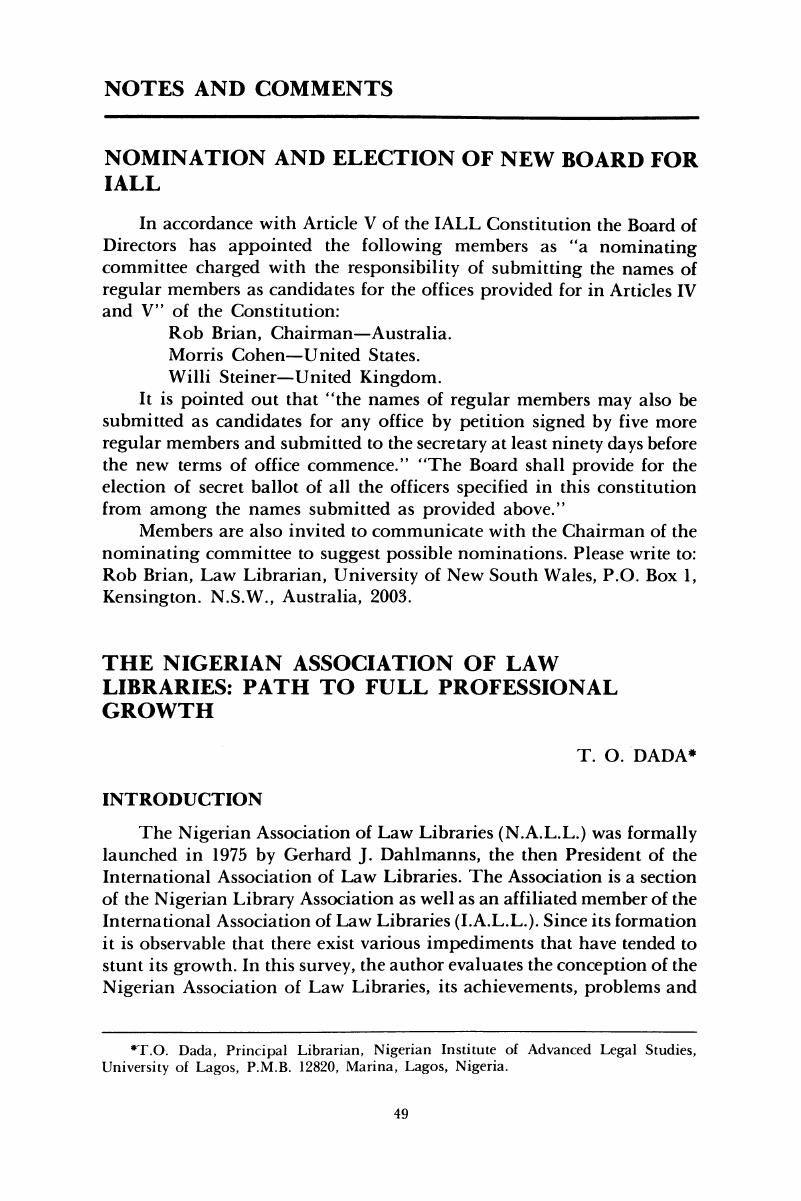No CrossRef data available.
Published online by Cambridge University Press: 28 February 2019

1. Oluremi Jegede, “Special libraries: their role and place in legal, political and social development of Nigeria. Lagos: Nigerian Institute of Advanced Legal Studies, 1983, p. 7. The legal profession actually clocked its 99th year in Nigeria in 1985 with the enrollment of Sapara-Williams at the Supreme Court.Google Scholar
2. Nigerian Association of Law Libraries, 2nd International Workshop and 3rd General Conference, March 1981; PROGRAMME p. 13.Google Scholar
3. Harris, John, “Why a professional association?” Nigerian Libraries, 1964, p. 6.Google Scholar
4. Since its inception in 1975, the Association has so far organised and co-sponsored Annual General Meeting/Conference in 1979 and 1981 respectively. It also participated fully in an International Seminar on Effective Law Library Services for Nigeria held in June, 1984 under the auspices of the Nigerian Institute of Advanced Legal Studies, Lagos.Google Scholar
5. This welcoming trend is a marked improvement on the situation in the preformation period. For example, N.A. Ogbeide had cause to summarise the position as follows:Google Scholar
“… the bulk of our library users, the Lawyers and Attorneys in Nigeria shockingly make comparatively less use of Law Libraries than their counterparts in Europe and America. Inspite of their intimate knowledge of legal materials and their reliance on sources of law, most members of the legal profession … have an astonishingly imprecise conception about the real potentials of law libraries”.Google Scholar
See N. A. Ogbeide, “Law Librarianship in Nigeria; history development and problems, International Journal of Law Libraries, 1976, no. 1, p. 19–26.Google Scholar
6. See generally: (a) J. O. Dipeolu,* “Some problems facing the library profession in Nigeria”, Nigerian Libraries (1976), no. 1, p. 1–3; (b) O. O. Ogundipe*, “Some issues of Nigerian Librarianship, Nigerian Libraries (1980), no. 3, p. 1-3.Google Scholar
* Both Dipeolu and Ogundipe are senior members of the Nigerian Library Association as well as the University Librarians for the Universities of Ife, and Benin, respectively.Google Scholar
7. Olu Odumosu, The law libraries in a post-military era. A talk delivered to the second annual conference of the Nigerian Association of Law Libraries, March 1979. p.5.Google Scholar
8. However, the Council of legal Education is now poised to establishing and maintaining standards for the faculties of law in the Nigerian Universities. It has now set up an Accreditation Panel that will inspect all facilities including the library. This fact was disclosed by the incumbent Director of the Nigerian Law School, Mr. B. A. Ibironke while contributing to discussions at a lecture titled “A Quarter Century of Legal Education in Nigeria” delivered by Professor E. I. Nwogugu at the Nigerian Institute of Advanced Legal Studies, Lagos on Friday 15th March, 1985. Surely, the Nigerian Association of Law Libraries should normally have handled the law library aspects of this worthwhile exercise.Google Scholar
9. For instance, the introduction of Military Regime in December 1983 led to the suspension of parts of the constitution dealing with the Legislature and the Executive. The abolition of the National Assembly and the States’ Assemblies occasioned the closing down or merging of libraries servicing the bodies. Redeployment or retrenchment of library staff followed and the adverse consequences on the development of law libraries and law librarianship was immense.Google Scholar
10. Dahlmanns, Gerhard J., The law library profession. International Journal of Law Libraries (1975), no.2, July, p. 114.Google Scholar